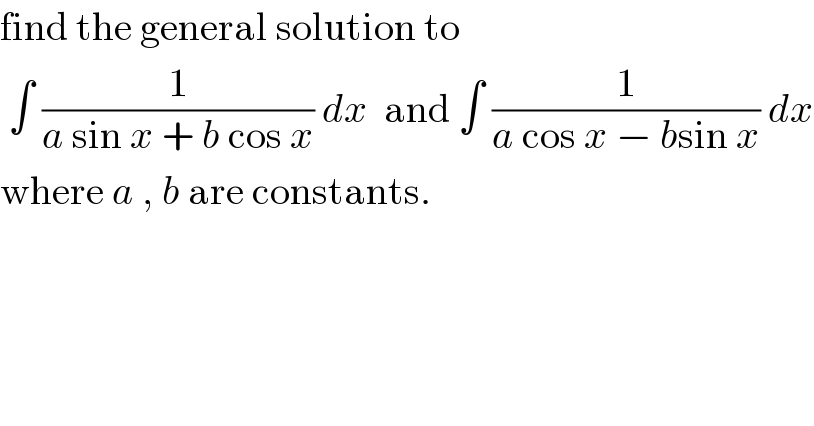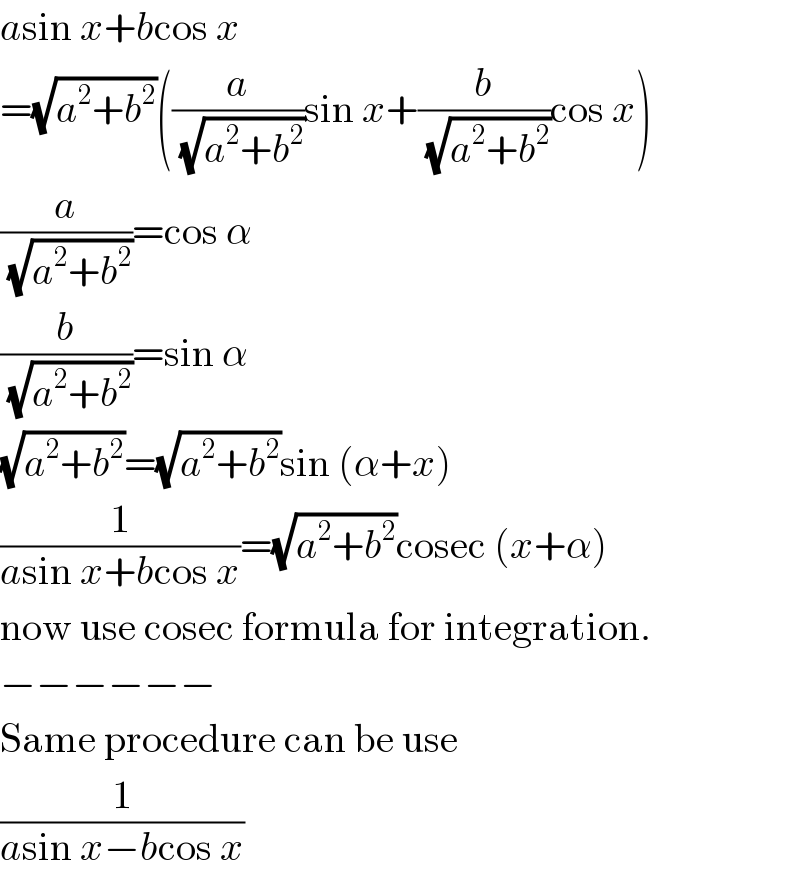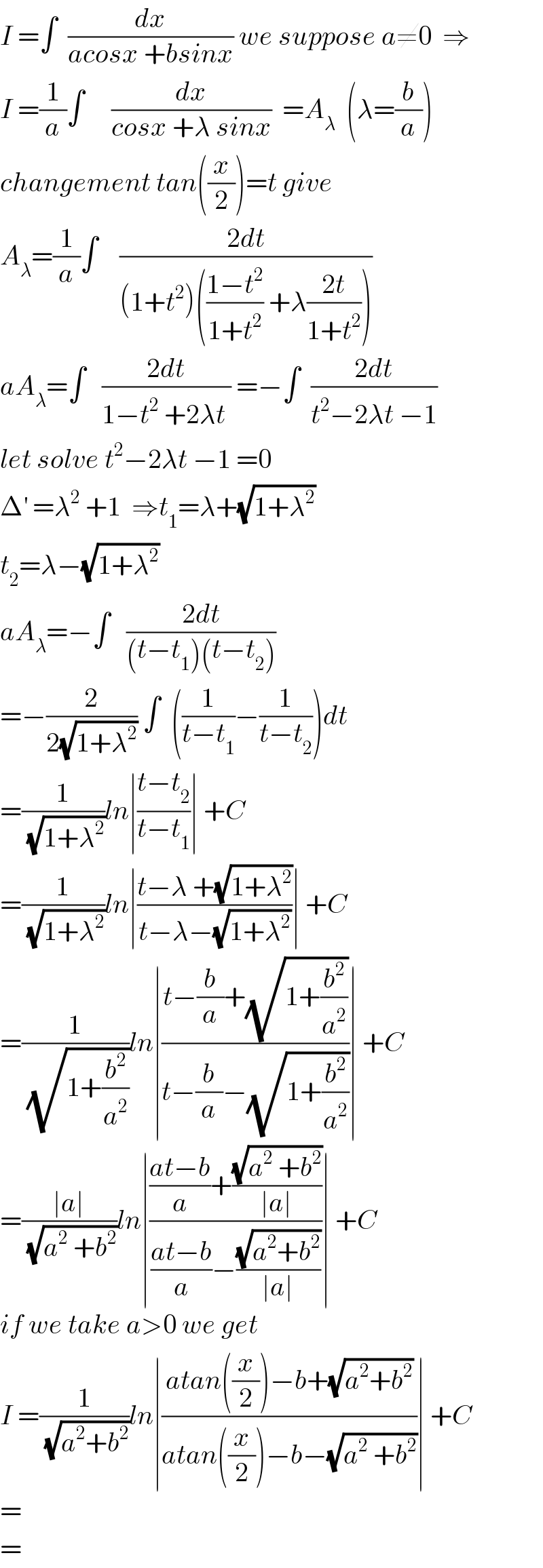Question Number 93098 by Rio Michael last updated on 10/May/20

$$\mathrm{find}\:\mathrm{the}\:\mathrm{general}\:\mathrm{solution}\:\mathrm{to} \\ $$$$\:\int\:\frac{\mathrm{1}}{{a}\:\mathrm{sin}\:{x}\:+\:{b}\:\mathrm{cos}\:{x}}\:{dx}\:\:\mathrm{and}\:\int\:\frac{\mathrm{1}}{{a}\:\mathrm{cos}\:{x}\:−\:{b}\mathrm{sin}\:{x}}\:{dx} \\ $$$$\mathrm{where}\:{a}\:,\:{b}\:\mathrm{are}\:\mathrm{constants}. \\ $$$$ \\ $$
Commented by prakash jain last updated on 10/May/20

$${a}\mathrm{sin}\:{x}+{b}\mathrm{cos}\:{x} \\ $$$$=\sqrt{{a}^{\mathrm{2}} +{b}^{\mathrm{2}} }\left(\frac{{a}}{\:\sqrt{{a}^{\mathrm{2}} +{b}^{\mathrm{2}} }}\mathrm{sin}\:{x}+\frac{{b}}{\:\sqrt{{a}^{\mathrm{2}} +{b}^{\mathrm{2}} }}\mathrm{cos}\:{x}\right) \\ $$$$\frac{{a}}{\:\sqrt{{a}^{\mathrm{2}} +{b}^{\mathrm{2}} }}=\mathrm{cos}\:\alpha \\ $$$$\frac{{b}}{\:\sqrt{{a}^{\mathrm{2}} +{b}^{\mathrm{2}} }}=\mathrm{sin}\:\alpha \\ $$$$\sqrt{{a}^{\mathrm{2}} +{b}^{\mathrm{2}} }=\sqrt{{a}^{\mathrm{2}} +{b}^{\mathrm{2}} }\mathrm{sin}\:\left(\alpha+{x}\right) \\ $$$$\frac{\mathrm{1}}{{a}\mathrm{sin}\:{x}+{b}\mathrm{cos}\:{x}}=\sqrt{{a}^{\mathrm{2}} +{b}^{\mathrm{2}} }\mathrm{cosec}\:\left({x}+\alpha\right) \\ $$$$\mathrm{now}\:\mathrm{use}\:\mathrm{cosec}\:\mathrm{formula}\:\mathrm{for}\:\mathrm{integration}. \\ $$$$−−−−−− \\ $$$$\mathrm{Same}\:\mathrm{procedure}\:\mathrm{can}\:\mathrm{be}\:\mathrm{use} \\ $$$$\frac{\mathrm{1}}{{a}\mathrm{sin}\:{x}−{b}\mathrm{cos}\:{x}} \\ $$
Commented by Rio Michael last updated on 10/May/20

$$\mathrm{thank}\:\mathrm{you}\:\mathrm{sir}. \\ $$
Commented by abdomathmax last updated on 11/May/20

$${I}\:=\int\:\:\frac{{dx}}{{acosx}\:+{bsinx}}\:{we}\:{suppose}\:{a}\neq\mathrm{0}\:\:\Rightarrow \\ $$$${I}\:=\frac{\mathrm{1}}{{a}}\int\:\:\:\:\:\frac{{dx}}{{cosx}\:+\lambda\:{sinx}}\:\:={A}_{\lambda} \:\:\left(\lambda=\frac{{b}}{{a}}\right) \\ $$$${changement}\:{tan}\left(\frac{{x}}{\mathrm{2}}\right)={t}\:{give} \\ $$$${A}_{\lambda} =\frac{\mathrm{1}}{{a}}\int\:\:\:\:\frac{\mathrm{2}{dt}}{\left(\mathrm{1}+{t}^{\mathrm{2}} \right)\left(\frac{\mathrm{1}−{t}^{\mathrm{2}} }{\mathrm{1}+{t}^{\mathrm{2}} }\:+\lambda\frac{\mathrm{2}{t}}{\mathrm{1}+{t}^{\mathrm{2}} }\right)} \\ $$$${aA}_{\lambda} =\int\:\:\:\frac{\mathrm{2}{dt}}{\mathrm{1}−{t}^{\mathrm{2}} \:+\mathrm{2}\lambda{t}\:}\:=−\int\:\:\frac{\mathrm{2}{dt}}{{t}^{\mathrm{2}} −\mathrm{2}\lambda{t}\:−\mathrm{1}} \\ $$$${let}\:{solve}\:{t}^{\mathrm{2}} −\mathrm{2}\lambda{t}\:−\mathrm{1}\:=\mathrm{0} \\ $$$$\Delta^{'} \:=\lambda^{\mathrm{2}} \:+\mathrm{1}\:\:\Rightarrow{t}_{\mathrm{1}} =\lambda+\sqrt{\mathrm{1}+\lambda^{\mathrm{2}} } \\ $$$${t}_{\mathrm{2}} =\lambda−\sqrt{\mathrm{1}+\lambda^{\mathrm{2}} } \\ $$$${aA}_{\lambda} =−\int\:\:\:\frac{\mathrm{2}{dt}}{\left({t}−{t}_{\mathrm{1}} \right)\left({t}−{t}_{\mathrm{2}} \right)} \\ $$$$=−\frac{\mathrm{2}}{\mathrm{2}\sqrt{\mathrm{1}+\lambda^{\mathrm{2}} }}\:\int\:\:\left(\frac{\mathrm{1}}{{t}−{t}_{\mathrm{1}} }−\frac{\mathrm{1}}{{t}−{t}_{\mathrm{2}} }\right){dt} \\ $$$$=\frac{\mathrm{1}}{\:\sqrt{\mathrm{1}+\lambda^{\mathrm{2}} }}{ln}\mid\frac{{t}−{t}_{\mathrm{2}} }{{t}−{t}_{\mathrm{1}} }\mid\:+{C} \\ $$$$=\frac{\mathrm{1}}{\:\sqrt{\mathrm{1}+\lambda^{\mathrm{2}} }}{ln}\mid\frac{{t}−\lambda\:+\sqrt{\mathrm{1}+\lambda^{\mathrm{2}} }}{{t}−\lambda−\sqrt{\mathrm{1}+\lambda^{\mathrm{2}} }}\mid\:+{C} \\ $$$$=\frac{\mathrm{1}}{\:\sqrt{\mathrm{1}+\frac{{b}^{\mathrm{2}} }{{a}^{\mathrm{2}} }}}{ln}\mid\frac{{t}−\frac{{b}}{{a}}+\sqrt{\mathrm{1}+\frac{{b}^{\mathrm{2}} }{{a}^{\mathrm{2}} }}}{{t}−\frac{{b}}{{a}}−\sqrt{\mathrm{1}+\frac{{b}^{\mathrm{2}} }{{a}^{\mathrm{2}} }}}\mid\:+{C} \\ $$$$=\frac{\mid{a}\mid}{\:\sqrt{{a}^{\mathrm{2}} \:+{b}^{\mathrm{2}} }}{ln}\mid\frac{\frac{{at}−{b}}{{a}}+\frac{\sqrt{{a}^{\mathrm{2}} \:+{b}^{\mathrm{2}} }}{\mid{a}\mid}}{\frac{{at}−{b}}{{a}}−\frac{\sqrt{{a}^{\mathrm{2}} +{b}^{\mathrm{2}} }}{\mid{a}\mid}}\mid\:+{C} \\ $$$${if}\:{we}\:{take}\:{a}>\mathrm{0}\:{we}\:{get} \\ $$$${I}\:=\frac{\mathrm{1}}{\:\sqrt{{a}^{\mathrm{2}} +{b}^{\mathrm{2}} }}{ln}\mid\frac{{atan}\left(\frac{{x}}{\mathrm{2}}\right)−{b}+\sqrt{{a}^{\mathrm{2}} +{b}^{\mathrm{2}} }}{{atan}\left(\frac{{x}}{\mathrm{2}}\right)−{b}−\sqrt{{a}^{\mathrm{2}} \:+{b}^{\mathrm{2}} }}\mid\:+{C} \\ $$$$= \\ $$$$= \\ $$
Commented by Rio Michael last updated on 11/May/20

$$\mathrm{wow}\:\mathrm{sir}\:\mathrm{spendid} \\ $$
Commented by mathmax by abdo last updated on 11/May/20

$${thankx} \\ $$
